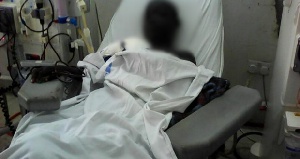 File photo of a dialysis patient
File photo of a dialysis patient
Pharmacist and Fellow at CDD-GHANA, Dr. Kwame Asiedu Sarpong, has disputed the National Health Insurance Scheme’s (NHIS) claim of having the financial muscle to offer six months of free dialysis sessions to vulnerable individuals suffering kidney diseases in Ghana.
Per the social intervention, Government through the NHIS is absorbing the cost of 8 dialysis sessions every month for each renal patient aged below eighteen and above 65 years.
The intervention will further cater for two dialysis sessions for a hundred and forty-seven patients aged between 18 and 59 in all public hospitals offering dialysis services except for the Korle Bu Teaching Hospital where a philanthropist is subsidizing the cost for patients.
According to Dr Asiedu Sarpong, patients below eighteen and above 65 stands at 73 beneficiaries, representing less than ten per cent of the 1034 persons on renal dialysis course in Ghana.
He noted that to cater for the entire 73 patients alone, the government would need GH¢7,455,344 million.
Speaking on Abusua Nkommo with Kojo Marfo, Dr. Sarpong described the NHIS’s calculations as inaccurate.
Dr Sarpong explained, “The Fees and Charges committee in Parliament has stated that the cost of dialysis per session is GH¢491. The NHIS claims to perform eight dialysis sessions per month for the remaining 73 patients, which means these patients would visit the machines 584 times per month.
“The six months of free service claimed by NHIS calculated in weeks is equivalent to 26 weeks. Multiplying this by the number of monthly sessions (584), we get a total sum of 15,184 sessions.”
"To determine the actual money needed to offer free service, Dr. Sarpong multiplied the total number of sessions (15,184) by parliament's approved fees and charges of GH¢491 cedis to arrive at a figure of GH¢7,455,344.
According to Dr. Sarpong, the amount of GH¢2million approved by Parliament for NHIS can only cover six and a half weeks of dialysis for the most vulnerable 73 renal dialysis patients.
He also noted that NHIS would need an additional GH¢5.5 million to cater for their required six months of free service.
Dr. Sarpong stated, “If you subtract the approved Parliament money of GH¢2 million from the amount they will need to cater for the six months of dialysis, which is almost GH¢7.5 million, there is a shortfall of GH¢5.5 million.”